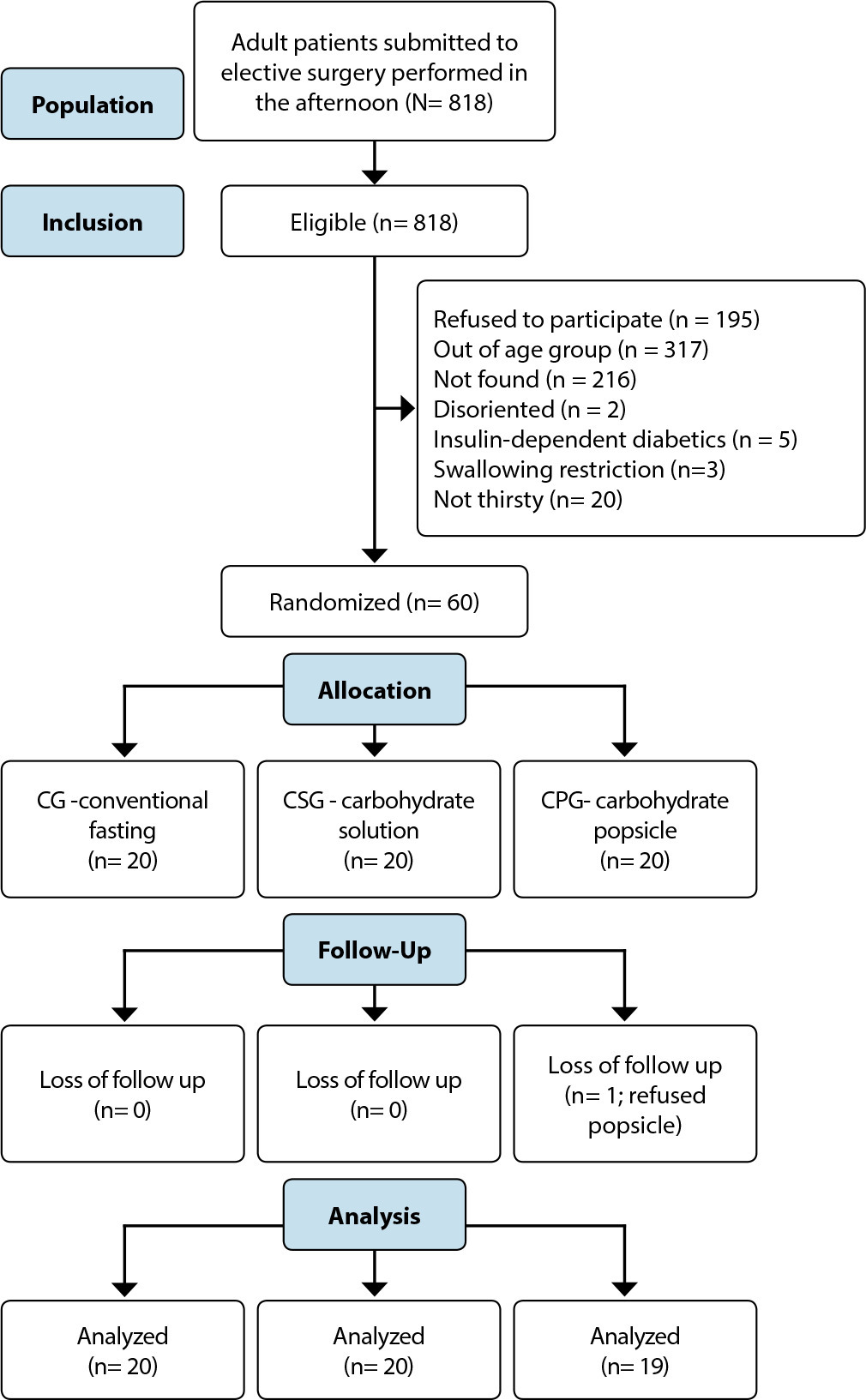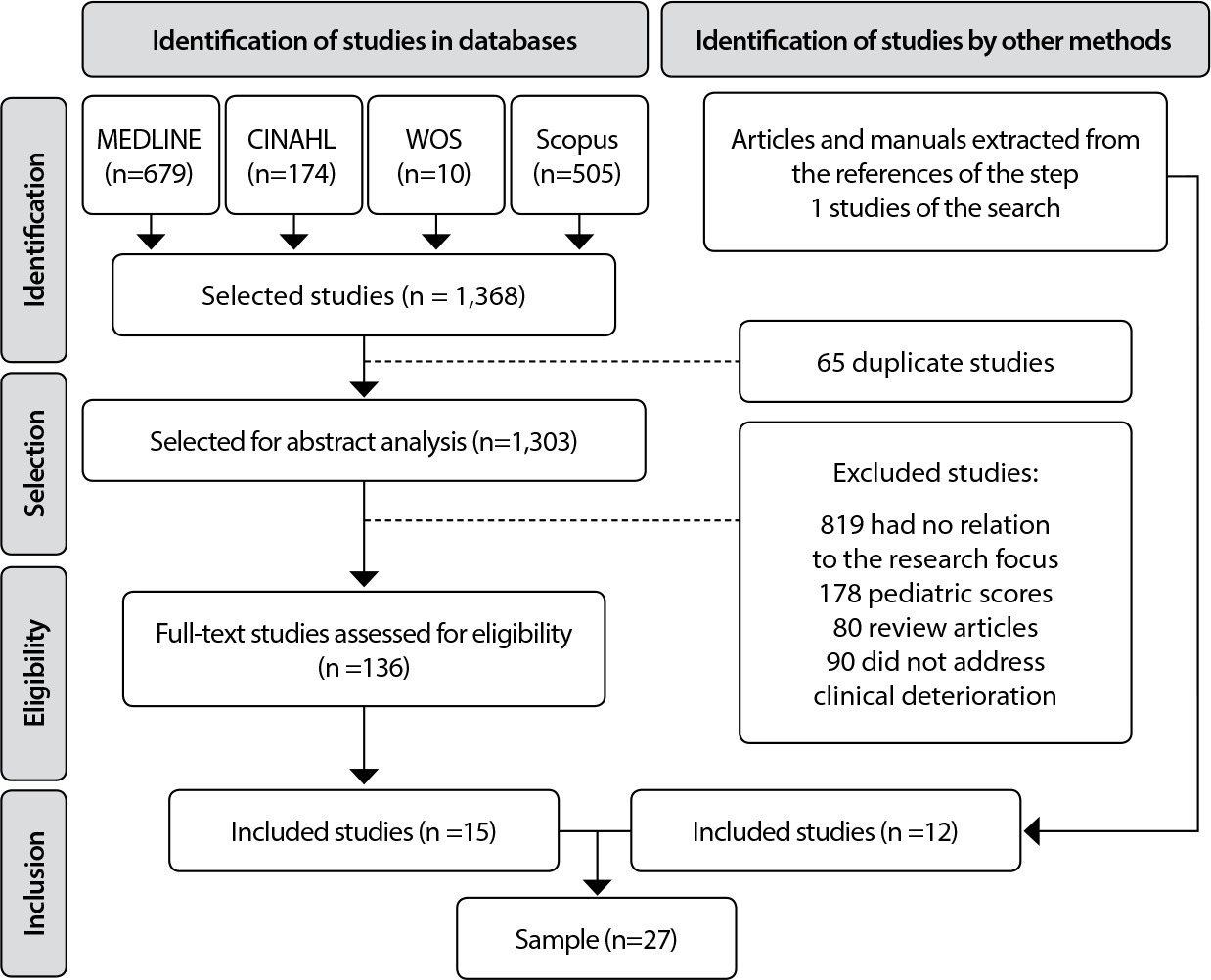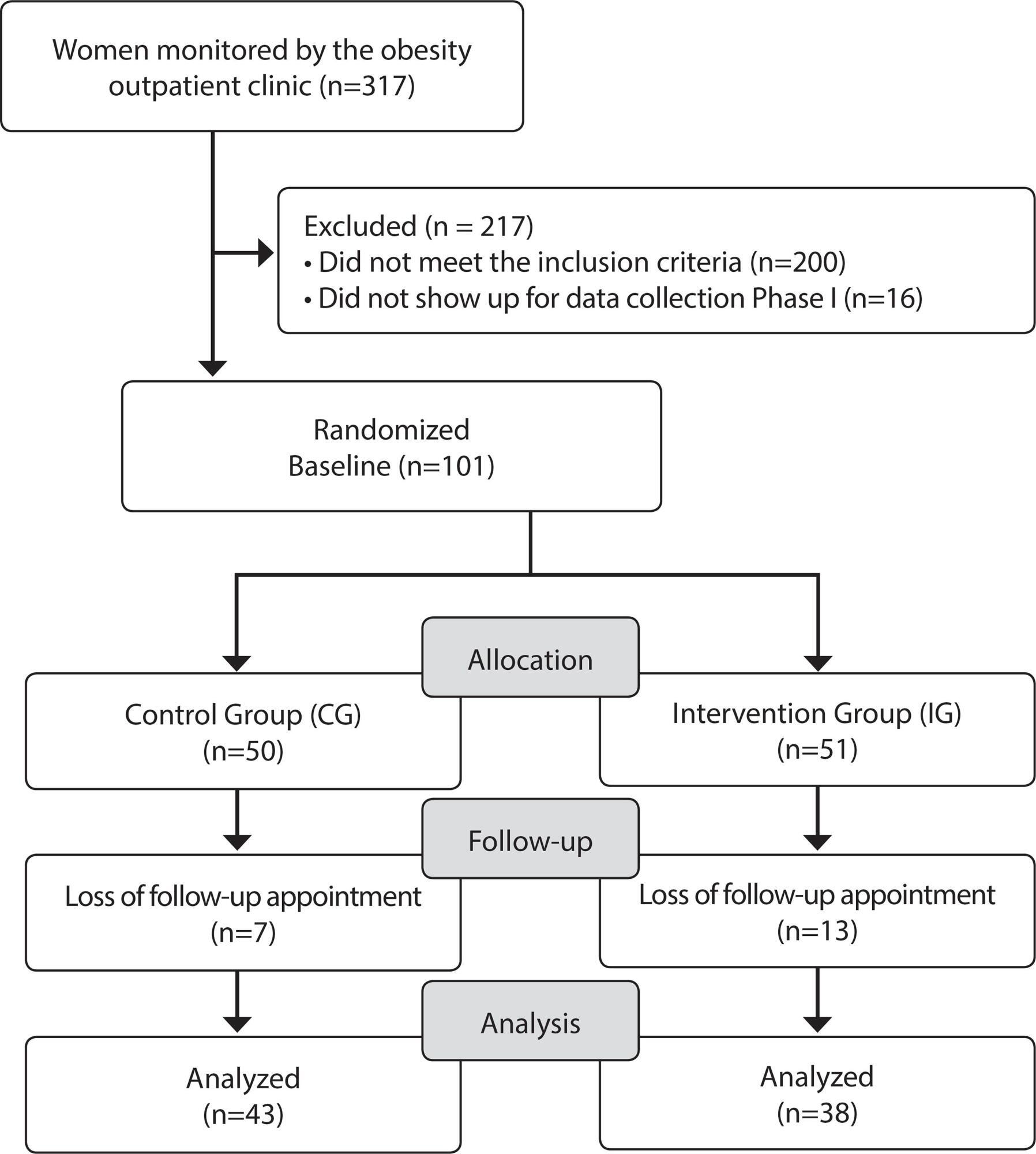-
ORIGINAL ARTICLE12-16-2024
Construction and validation of an educational game on biosafety in the central sterile supply department
Revista Brasileira de Enfermagem. 2024;77(6):e20230478
Abstract
ORIGINAL ARTICLEConstruction and validation of an educational game on biosafety in the central sterile supply department
Revista Brasileira de Enfermagem. 2024;77(6):e20230478
DOI 10.1590/0034-7167-2023-0478
Views0See moreABSTRACT
Objectives:
to construct and validate an educational game on biosafety in the Central Sterile Supply Department of a hospital in Curitiba, PR.
Methods:
the study was conducted using a quantitative approach, employing applied and technological research with an exploratory design. The process was divided into six stages, from the definition of the theme to the validation and application of the game. The study was carried out from May to August 2022, involving 17 nursing professionals from a Central Sterile Supply Department during day and night shifts, as well as 9 judges.
Results:
the study resulted in the construction of a board game named by the authors as “My Health First.”
Conclusions:
the research achieved its objective of constructing and validating an educational game. By reflecting on professional practice and correlating the occupational risks present, the professionals were able to list safe actions, identify problems, and seek solutions.

-
ORIGINAL ARTICLE12-16-2024
Health literacy development of Primary Health Care patients: qualitative research
Revista Brasileira de Enfermagem. 2024;77(6):e20240154
Abstract
ORIGINAL ARTICLEHealth literacy development of Primary Health Care patients: qualitative research
Revista Brasileira de Enfermagem. 2024;77(6):e20240154
DOI 10.1590/0034-7167-2024-0154
Views0See moreABSTRACT
Objectives:
to identify the process of health literacy development among primary care patients, relating it to their self-care practices.
Methods:
qualitative, prospective research with 22 patients from two Family Health Strategy units. Data were obtained through individual semi-structured interviews, examined through descriptive statistics and thematic content analysis.
Results:
the results discuss how participants learn about health and how this resonates in their behaviors, culminating in two thematic categories: “Health knowledge construction”; and “Dialogue between health knowledge construction and patient care actions”.
Final Considerations:
health knowledge is developed mainly through interpersonal relationships, mediated by health professionals through bonding and communication. Community educational actions and training of health professionals in communication can promote health literacy and self-care among patients.

-
ORIGINAL ARTICLE12-16-2024
Analysis of omission of antimicrobial doses in Intensive Care Units
Revista Brasileira de Enfermagem. 2024;77(6):e20240102
Abstract
ORIGINAL ARTICLEAnalysis of omission of antimicrobial doses in Intensive Care Units
Revista Brasileira de Enfermagem. 2024;77(6):e20240102
DOI 10.1590/0034-7167-2024-0102
Views0See moreABSTRACT
Objectives:
to analyze the rate of antimicrobial dose omission in intensive care units.
Methods:
cross-sectional study carried out between March 1 and September 30, 2023, in intensive care units of a University Hospital in Rio de Janeiro.
Results:
the sample consisted of 452 prescriptions and 1467 antimicrobial doses. The dose omission rate was 4.29%. Each antimicrobial prescribed increased the chance of omission by 51%. The strategy of double-checking prescriptions helped prevent 30% of antimicrobial dose omissions (p=0.0001).
Conclusions:
monitoring the omission of antimicrobial doses can guide nursing actions to improve quality and patient safety, contributing to the prevention of medication errors, antimicrobial stewardship and the fight against antimicrobial resistance.
-
REVIEW12-16-2024
Recommendations for guidelines for promoting mental health in the workplace: an umbrella review
Revista Brasileira de Enfermagem. 2024;77(6):e20240086
Abstract
REVIEWRecommendations for guidelines for promoting mental health in the workplace: an umbrella review
Revista Brasileira de Enfermagem. 2024;77(6):e20240086
DOI 10.1590/0034-7167-2024-0086
Views1See moreABSTRACT
Objectives:
to summarize the recommendations of guidelines for promoting mental health in the workplace.
Methods:
an umbrella review, according to Joanna Briggs Institute and Preferred Reporting Items for Systematic reviews and Meta-Analyses methodological assumptions. Data collection was carried out in January 2021 and updated in July 2023 in the American Psychological Association, Cochrane Library, EMBASE, National Library of Medicine, and Scopus databases. Systematic reviews that assessed guidelines with recommendations for mental health care for workers were included. PROSPERO registration CRD42023461845.
Results:
four systematic reviews published between 2015 and 2018 were identified. The abstracts highlighted actions that facilitate and inhibit the recommendations as well as three categories of intervention: primary prevention – worker protection; secondary prevention – promoting workers’ mental health; and tertiary prevention – supporting, monitoring and rehabilitating workers upon returning to work.
Conclusions:
the interventions are based on prevention, promotion and early recognition, support and rehabilitation of mental health problems.

-
ORIGINAL ARTICLE12-16-2024
Psychometric analysis of ProQOL-BR in nursing: building hospital safety and protection
Revista Brasileira de Enfermagem. 2024;77(6):e20240085
Abstract
ORIGINAL ARTICLEPsychometric analysis of ProQOL-BR in nursing: building hospital safety and protection
Revista Brasileira de Enfermagem. 2024;77(6):e20240085
DOI 10.1590/0034-7167-2024-0085
Views0See moreABSTRACT
Objectives:
to analyze the psychometric properties of the ProQOL-BR instrument in hospital nursing professionals.
Methods:
a methodological study to validate the ProQOL-BR. Confirmatory factor analysis, assessment of local and global adjustment quality, Pearson hypothesis testing and Cronbach’s alpha internal consistency analysis were used.
Results:
a total of 490 professionals participated. The model presents adequate quality due to factor weights (λ≥ 0.40), acceptable overall fit quality and adequate chi-square ratio and degrees of freedom (χ2/g.1=2.51) for the parameters of CFI (0.923), GFI (0.902), TLI (0.914) and RMSEA (0.042). In terms of validity, it was shown to be adequate with CC=0.89. The internal consistency obtained by standardized Cronbach’s alpha was 0.761. Criterion validity was shown to be favorable with significant correlations (0.001).
Conclusions:
the instrument was validated regarding content, criteria and reliability. Three questions were removed from the original instrument, ProQOL-BR, leaving the final instrument with 25 questions.

-
12-16-2024
GerenciaDOR™: development of digital technology by nurses for the assessment of patients with chronic pain
Revista Brasileira de Enfermagem. 2024;77(6):e20240050
Abstract
GerenciaDOR™: development of digital technology by nurses for the assessment of patients with chronic pain
Revista Brasileira de Enfermagem. 2024;77(6):e20240050
DOI 10.1590/0034-7167-2024-0050
Views0See moreABSTRACT
Objectives:
to develop a digital technological solution (prototype) for assessing patients with chronic pain.
Methods:
this is a methodological and technological development study based on the Human-Centered Design framework and the principles of Patient-Centered Care. The prototype guides patients through a body diagram and directs them to an evaluation using specific instruments that address the multidimensional aspects of chronic pain.
Results:
the GerenciaDOR* project enables navigation through the Web App screens, providing access to pain assessment features up to the presentation of results.
Final Considerations:
the study describes a systematic approach to pain assessment and expands nurses’ knowledge in pain management. Additionally, it can promote the development of other digital technologies for chronic pain assessment and contribute to a multidisciplinary, patient centered treatment.

-
ORIGINAL ARTICLE12-16-2024
Respectful care for postpartum women with sickle cell disease: a netnographic study
Revista Brasileira de Enfermagem. 2024;77(6):e20230545
Abstract
ORIGINAL ARTICLERespectful care for postpartum women with sickle cell disease: a netnographic study
Revista Brasileira de Enfermagem. 2024;77(6):e20230545
DOI 10.1590/0034-7167-2023-0545
Views1See moreABSTRACT
Objectives:
to analyze principles of respectful maternity care in narratives of postpartum women with sickle cell disease, relating them to Sustainable Development Goals.
Methods:
netnographic study, with two videos published in 2020. Deductive iconographic and thematic analysis by Respectful Maternity Care Charter, organized in MAXQDA.
Results:
principles identified were the right to: freedom from harm and ill-treatment; information, informed consent, refusal of medical procedures, and respect for their choices and preferences including companion; be considered a person from birth, with dignified and respectful treatment; health at the highest possible level; newborns being with their parents or guardians. The Sustainable Development Goals for women by 2030 were not positively contemplated in postpartum women’s experience.
Final Considerations:
it is appropriate that health workers qualify themselves to provide respectful maternity care, with qualified listening, understanding, and resolution of unique demands of postpartum women with sickle cell disease, seeking equality in care for women.

-
REVIEW12-16-2024
Strategies for expanding vaccination coverage in children in Brazil: systematic literature review
Revista Brasileira de Enfermagem. 2024;77(6):e20230343
Abstract
REVIEWStrategies for expanding vaccination coverage in children in Brazil: systematic literature review
Revista Brasileira de Enfermagem. 2024;77(6):e20230343
DOI 10.1590/0034-7167-2023-0343
Views1See moreABSTRACT
Objectives:
to identify the strategies found in the literature for increasing vaccination coverage among children in Brazil. It is justified mainly by the current scenario of falling vaccination coverage.
Methods:
systematic literature review. The search was carried out in the Pubmed (MEDLINE), Embase and Scopus databases, following the PRISMA guidelines.
Results:
initially, 4,824 results were returned. In the end, 6 studies were included for narrative synthesis using the SWiM methodology. Of these, 50% dealt with studies related to the Bolsa Família Program (PBF). The others explored strategies for approaching parents directly, Rapid Vaccination Monitoring (MRV) and the Community Health Agents Program (PACS). The PBF did not guarantee compliance with the conditionality of keeping vaccinations up to date. The MRV and PACS are effective strategies, especially because they allow active search for absentees.
Conclusions:
we conclude that more publications are needed on strategies to increase vaccination coverage among children in Brazil.

-
02-25-2022
The multidimensional model of hope as a recovery-focused practice in mental health nursing
Revista Brasileira de Enfermagem. 2022;75:e20210474
Abstract
The multidimensional model of hope as a recovery-focused practice in mental health nursing
Revista Brasileira de Enfermagem. 2022;75:e20210474
DOI 10.1590/0034-7167-2021-0474
Views0See moreABSTRACT
Objective:
To analyze the theoretical dimensions of hope as a recovery-oriented practice in mental health nursing.
Method:
This is a reflective and discursive study based on theoretical and experiential aspects of hope in the recovery process of people facing mental health disorders.
Results:
Maintaining hope in adverse situations, especially while facing mental suffering, requires skills to manage the factors that promote and inhibit hope. This balance can be tricky to reach without the presence of high-skilled professionals. The study presents the concept of hope-inspiring competence and its main dimensions. The nurse’s hope-inspiring competence is recognized as a crucial advanced practice that optimizes mental health by providing motivational resources. Final Considerations: Hope-inspiring competence should be a core principle for recovery-oriented mental health professionals. Despite this recognition, the promotion of hope in mental health nursing specialized practice lacks evidence and visibility.
-
ORIGINAL ARTICLE12-05-2019
Falls of elderly people living in rural areas: prevalence and associated factors
Revista Brasileira de Enfermagem. 2019;72:177-183
Abstract
ORIGINAL ARTICLEFalls of elderly people living in rural areas: prevalence and associated factors
Revista Brasileira de Enfermagem. 2019;72:177-183
DOI 10.1590/0034-7167-2018-0460
Views0See moreABSTRACT
Objective:
to identify the prevalence and factors associated with falls in the elderly population living in rural areas.
Method:
this is a cross-sectional study, carried out in 2014, with 820 older adults recorded in the Family Health Strategy (Estratégia Saúde da Família). The association between the reporting of falls in 12 months and their associated factors was verified by the Chi-square and Fischer’s exact tests and by multivariate logistic regression analysis.
Results:
the majority of the sample was female (56.1%), white (90.2%) and aged 60-69 years (54.9%). The prevalence of falls was 27.9%, and being female, hypertensive and diabetic was associated to falls.
Conclusion:
it is the responsibility of health professionals to have a closer look at the elderly who have these chronic diseases, especially within the scope of the Family Health Strategy, which works longitudinally with these patients, in addition to improving nursing care aimed at this population.
-
ORIGINAL ARTICLE09-21-2020
Family management ofchildren who experience sickle cell disease: a qualitative study
Revista Brasileira de Enfermagem. 2020;73:e20190521
Abstract
ORIGINAL ARTICLEFamily management ofchildren who experience sickle cell disease: a qualitative study
Revista Brasileira de Enfermagem. 2020;73:e20190521
DOI 10.1590/0034-7167-2019-0521
Views1See moreABSTRACT
Objective:
to know the family management experience of children with sickle cell disease in the light of the Family Management Style Framework.
Methods:
a qualitative case study carried out between September/2015 and July/2016 with 12 members of eight families registered in a blood center in Minas Gerais. The semi-structured interviews were recorded, and the data were analyzed and interpreted by the hybrid model thematic analysis.
Results:
three management styles were identified: five families in the accommodating style; two families in the struggling style; and only one family in the enduring style.It was noted that empowerment was paramount in the acquisition of skills and abilities to care for these children.
Final considerations:
family management knowledge of children with sickle cell disease provided a reflection on nurses’ role in supporting, orienting and encouraging the empowerment of these families aiming at the search for comprehensive care.
-
REVIEW09-21-2020
Postnatal care of newborns in the family context: an integrative review
Revista Brasileira de Enfermagem. 2020;73:e20190454
Abstract
REVIEWPostnatal care of newborns in the family context: an integrative review
Revista Brasileira de Enfermagem. 2020;73:e20190454
DOI 10.1590/0034-7167-2019-0454
Views0See moreABSTRACT
Objective:
to analyze the postnatal care practices of newborns in the family context from the scientific literature.
Methods:
the searches of the integrative literature review were carried out in the Latin American and Caribbean Literature in Health Sciences (LILACS), Nursing Database (BDENF), Scientific Electronic Library Online (SciELO), and U.S. National Library of Medicine (PubMed) databases.
Results:
sixteen studies composed the final sample and, from these, two analytical categories emerged: Practices and doubts of families in postnatal care of newborns; and Best practices in postnatal care of newborns.
Final considerations:
several cultural practices of families differ from scientific recommendations, which can generate risks to the health of newborns. Therefore, it is essential to consolidate educational programs with family members, to improve the quality of care offered and to reduce preventable neonatal deaths in different socio-family contexts.

-
ORIGINAL ARTICLE07-23-2021
Transition to exclusive palliative care for women with breast cancer
Revista Brasileira de Enfermagem. 2021;74(5):e20201325
Abstract
ORIGINAL ARTICLETransition to exclusive palliative care for women with breast cancer
Revista Brasileira de Enfermagem. 2021;74(5):e20201325
DOI 10.1590/0034-7167-2020-1325
Views0See moreABSTRACT
Objective:
to analyze the perspectives that affect the transition to exclusive palliative care for women with breast cancer.
Methods:
qualitative, descriptive study, carried out in a public health institution in Rio de Janeiro, Brazil, between December 2018 and May 2019. 28 health professionals were interviewed. Content analysis was used in the thematic modality.
Results:
the operational difficulties were linked to the fragmented physical structure, the late and unplanned nature of the referral, the ineffective communication, and the deficit of human resources. In general, women and family members resist referral because they do not know palliative care. There is no consensus among oncologists on the most appropriate time to stop systemic therapy for disease control.
Final considerations:
the perceived difficulties configure an abrupt referral, accompanied by false hopes and, often, limited to end-of-life care.
-
ORIGINAL ARTICLE07-22-2022
Effects of carbohydrate use on preoperative thirst: a randomized clinical trial
Revista Brasileira de Enfermagem. 2022;75(5):e20210355
Abstract
ORIGINAL ARTICLEEffects of carbohydrate use on preoperative thirst: a randomized clinical trial
Revista Brasileira de Enfermagem. 2022;75(5):e20210355
DOI 10.1590/0034-7167-2021-0355
Views0See moreABSTRACT
Objectives:
to evaluate the effectiveness of carbohydrate popsicles, carbohydrate solution, and usual care (fasting) on the intensity and discomfort of preoperative thirst.
Methods:
a randomized clinical trial with 60 preoperative patients aged between 18 and 60 years, randomized into three groups: control (fasting), carbohydrate solution (100 ml), and carbohydrate popsicle (100 ml). The outcomes were thirst intensity and discomfort.
Results:
there was a difference between groups for final thirst intensity (p = 0.01) and final thirst discomfort (p = 0.001). The effect size for both the Solution Group and the Popsicle Group was robust: 0.99 and 1.14, respectively.
Conclusions:
the groups that received the carbohydrate fasting abbreviation showed a reduction in thirst discomfort compared to the control group. The carbohydrate popsicle proved more effective in reducing the intensity of thirst. NCT: 3.209.283

-
REVIEW07-29-2022
Technologies used by nursing to predict clinical deterioration in hospitalized adults: a scoping review
Revista Brasileira de Enfermagem. 2022;75(5):e20210570
Abstract
REVIEWTechnologies used by nursing to predict clinical deterioration in hospitalized adults: a scoping review
Revista Brasileira de Enfermagem. 2022;75(5):e20210570
DOI 10.1590/0034-7167-2021-0570
Views1See moreABSTRACT
Objective:
to map the early clinical deterioration technologies used in nurses’ professional practice in the care of hospitalized adult patients.
Methods:
this is a scoping review, according to Joanna Briggs Institute Reviewer’s Manual, which seeks to map the main technologies for detecting early clinical deterioration of hospitalized patients available for use by nurses, summarizing them and indicating gaps in knowledge to be investigated.
Results:
twenty-seven studies were found. The most present variables in the technologies were vital signs, urinary output, awareness and risk scales, clinical examination and nurses’ judgment. The main outcomes were activation of rapid response teams, death, cardiac arrest and admission to critical care units.
Final considerations:
the study emphasizes the most accurate variables in patient clinical assessment, so that indicative signs of potential severity can be prioritized to guide health conducts aiming to intervene early in the face of ongoing clinical deterioration.

-
ORIGINAL ARTICLE12-13-2019
Effect of nursing telemonitoring on the knowledge of obese women: clinical trial
Revista Brasileira de Enfermagem. 2019;72:212-219
Abstract
ORIGINAL ARTICLEEffect of nursing telemonitoring on the knowledge of obese women: clinical trial
Revista Brasileira de Enfermagem. 2019;72:212-219
DOI 10.1590/0034-7167-2018-0500
Views0See moreABSTRACT
Objective:
To assess the effectiveness of remote monitoring in the knowledge of overweight women.
Method:
Randomized clinical trial with 101 women, randomly assigned to the control group (CG=50) and to the intervention group (IG=51). The IG received educational intervention over the telephone, during three months and routine follow-up in the service, while the CG only received conventional follow-up. The knowledge was assessed by a specific questionnaire. Data were analyzed by the Robust Linear Regression Model, adopting a statistical significance of 5%.
Results:
In the intragroup assessment, an increase in the correct answers with a statistically significant difference was observed only for the IG in the domains: “Concept and causes of overweight,” “Complications of overweight” and “Eating habits.” In the intergroup comparison, an increase in the average knowledge was verified in the same domains for the IG (p≤0.005).
Conclusion:
nursing telemonitoring contributed positively to the improvement of women’s knowledge.

Search
Search in:
Nuvem de Tags
Adolescente (85) Atenção Primária à Saúde (239) COVID-19 (91) Criança (91) Cuidados de Enfermagem (269) Educação em Enfermagem (151) Educação em Saúde (139) Enfermagem (930) Enfermagem Pediátrica (86) Estudantes de Enfermagem (77) Estudos de Validação (131) Família (87) Idoso (208) Promoção da Saúde (99) Qualidade de Vida (104) Saúde do Trabalhador (86) Saúde Mental (145) Saúde Pública (82) Segurança do Paciente (150) Tecnologia Educacional (100)



